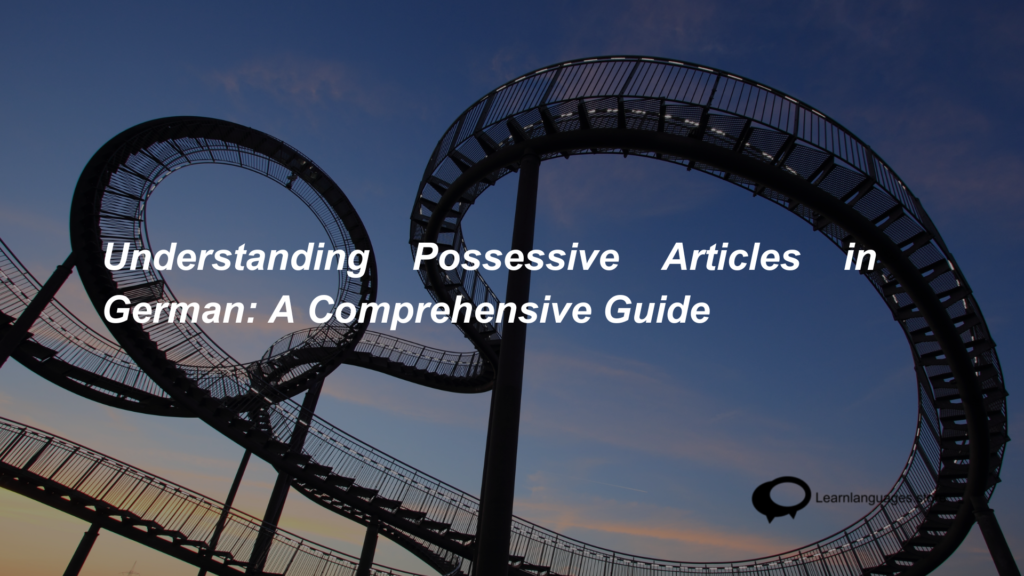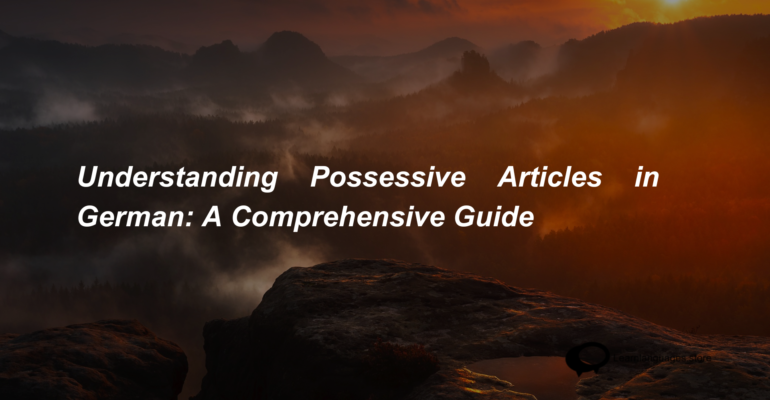Understanding Possessive Articles in German: A Comprehensive Guide
Understanding Possessive Articles in German: A Comprehensive Guide
Estimated reading time: 4 minutes
Table of contents
Welcome to the Learn Languages Store blog! In this lesson, we will explore a fundamental aspect of German grammar: possessive articles. Mastering possessive articles is essential for expressing ownership and relationships in the German language. By the end of this guide, you will have a solid understanding of how to use possessive articles correctly with nouns.

What Are Possessive Articles?
Possessive articles indicate ownership or possession. In German, they change based on the gender and number of the noun they refer to. The most common possessive articles are:
- mein (my)
- dein (your – informal singular)
- sein (his)
- ihr (her)
- unser (our)
- euer (your – informal plural)
- ihr (their)
- Ihr (your – formal)
These articles must agree in gender and number with the noun they modify.
-
Product on sale
 German B1
German B1₹32,600.00
₹42,600.00 -
Product on sale
 German A2
German A2₹24,300.00
₹32,600.00
Examples of Possessive Articles with Nouns
Let’s look at some examples using mein (my) and dein (your).
1. mein (my)
Example Sentences:
- Sentence: Das ist mein Buch.
Translation: This is my book.
Pronunciation: डास इस्ट माइन बुख - Sentence: Ich liebe mein Auto.
Translation: I love my car.
Pronunciation: इच लिबे माइन ऑटो - Sentence: Wo ist mein Schlüssel?
Translation: Where is my key?
Pronunciation: वो इस्ट माइन श्लूसेल? - Sentence: Mein Hund ist sehr freundlich.
Translation: My dog is very friendly.
Pronunciation: माइन हुंड इस्ट सेयर फ्रॉइंडलिख - Sentence: Ich schreibe mein Buch.
Translation: I am writing my book.
Pronunciation: इच श्राइबे माइन बुख
2. dein (your)
Example Sentences:
- Sentence: Ist das dein Buch?
Translation: Is that your book?
Pronunciation: इस्ट डास डाइन बुख? - Sentence: Ich mag dein Auto.
Translation: I like your car.
Pronunciation: इच माग डाइन ऑटो - Sentence: Wo ist dein Schlüssel?
Translation: Where is your key?
Pronunciation: वो इस्ट डाइन श्लूसेल? - Sentence: Dein Hund ist sehr süß.
Translation: Your dog is very cute.
Pronunciation: डाइन हुंड इस्ट सेयर सूस - Sentence: Ich habe dein Buch gelesen.
Translation: I read your book.
Pronunciation: इच हाबे डाइन बुख गेलेसेन
Why Are Possessive Articles Important?
Possessive articles are essential for expressing ownership in German. They help you specify to whom something belongs, making your communication more precise. Mastering these articles is a crucial step towards fluency in the German language.
Enhance Your German Skills!
To further improve your German skills, consider enrolling in our comprehensive A1 Level German Course at Learn Languages Store for just Rs. 16,300. Our courses are designed to help you master the essentials of the German language in an engaging and effective manner.
Contact Us to Learn More!
For more information about our courses, feel free to reach out to us at:
Address:
330, 3rd Floor, Big Splash (Near Vashi Bus Depot),
Sector 17, Vashi,
Navi Mumbai, Maharashtra 400703
Phone: +91-9594113111
Email: services@learnlanguages.store
Don’t miss out on the opportunity to elevate your language skills! Sign up today and embark on your journey to fluency in German!










